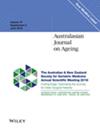Perceived acceptability of online volunteer-led exercise classes: Perspectives of rural volunteer exercise leaders and older people
Abstract
Objective
This study assessed perceived acceptability of online rural volunteer-led exercise classes among volunteer leaders and older people during the COVID-19 pandemic and interrogate differences in acceptability between older people who were currently participating in regular exercise and those who were not.
Method
A case study was conducted of an existing volunteer-led exercise program using a cross-sectional preintervention survey (38 volunteer exercise leaders and 172 program participants).
Results
Thirty per cent (n = 11) of the volunteer leaders reported an interest in running the online classes. Motivations included providing opportunities for participants and keeping themselves and participants fit. Thirty-four per cent (n = 42) of the older participants reported an intent to join the online classes, which was primarily attributed to the desire to keep active and to socialise. However, over 60% of the respondents across both categories did not want to engage in online exercise classes. This was primarily attributed to a preference for face-to-face classes and lack of confidence in conducting or using online activities or services. Older participants who did not regularly exercise were statistically more likely to report perceived challenges attending an online class, and to identify the use of internet-based technologies as a barrier to attendance.
Conclusion
Digital literacy was a challenge for the older respondents, particularly for those who were not currently engaged in regular exercise. Organisations implementing online exercise programs should recognise that this form of delivery will pose challenges to cohorts of rural older people who are not undertaking regular physical activity and address the individual and environmental barriers to digital uptake.

 求助内容:
求助内容: 应助结果提醒方式:
应助结果提醒方式:


